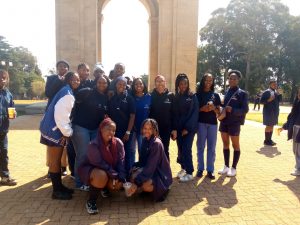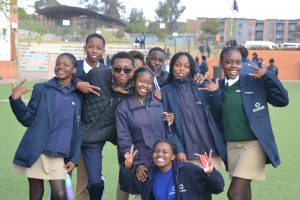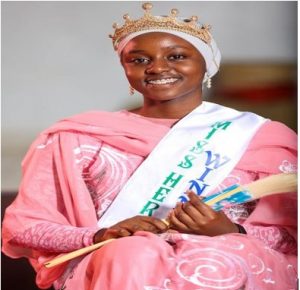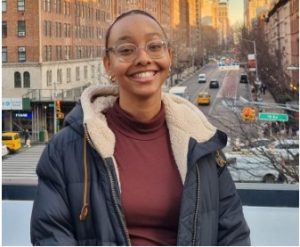If I were to choose two words to describe this experience for me, they would be, Life Changing and Memorable. In June, I had the opportunity to travel to the United States of America to attend a two-week summer program offered by Yale University. When I decided to apply back
If I were to choose two words to describe this experience for me, they would be, Life Changing and Memorable.
In June, I had the opportunity to travel to the United States of America to attend a two-week summer program offered by Yale University. When I decided to apply back in October of last year, I had no major reason for applying, I was simply just drawn to the program and that proved to be the best decision I have made so far in all my seventeen years of living. After months of anxious waiting I received the long-awaited congratulations message, on the morning of the 21st of December.
On the 18th of June, my nine months of long wait came to an end. I travelled to the United States of America to attend the Yale Young Global Scholars, 2023.
Check-in was between 9 am-4 pm ET at Davenport College. I arrived at 9 am. I was assigned to Jonathan Edwards College which was relatively quiet as per my preference. We were assigned to suites and in each suite were individual rooms. My mother and family friends helped me settle in for about two hours until they left because they did not want to be late for church. Then I was alone. And that’s when it all sunk in. Had I just flown across the world for the very first time? Was I walking in the streets of New Haven? Was I attending a summer program hosted by one of the most prestigious schools in the world? After unpacking, came the hard part … getting to know people.
Luckily I made it through that hurdle and by around 3 pm I had made it past the awkward first-time meeting formalities and had gotten used to making conversation with others. At 4 p.m. those from Jonathan Edwards gathered at the HQ lecture hall and we had a welcome briefing from the Residential Life Patrons. Around 7:40pm after dinner we finally met our families. Our family leader took us on a family walk to show areas we had access to and areas we did not in New Haven.
On applying one had four academic tracks to choose from
- Innovations in Science & Technology(IST)
- Literature, Philosophy, & Culture (LPC)
- Politics, Law, & Economics (PLE)
- Solving Global Challenges (SGC)
The YYGS curriculum is divided into:
- Breakout Discussions where you dig deeper into lecture content by sharing knowledge, posing questions, and brainstorming real-world implications with members of your family. During this time several debates arose which left you questioning your initial standing.
- Capstone Project –We had the liberty of choosing the area we would like as our Capstone. I chose to do Global wealth and inequality. Under the mentorship of YYGS staff, the project is all about encouraging us to think carefully through difficult, real-world issues, engage in research, and work through various arguments and considerations (economic, social, cultural, legal, and political) to better understand a topic of concern. We were assigned to a team of four or five and were tasked with designing a presentation within our assigned theme.
The research question that my team finally settled on was : To what extent do fast food chains influence the economies of developed and developing countries, how does this contribute to societal inequality, and what potential solutions can address these issues?
And we prepared a thesis and a 15-minute presentation surrounding this question.
This had to be one of the most difficult components of the whole experience. My group and I had a rocky start. We were all butting heads with each other. One side wanted to focus on Amazon as a multinational corporation and how it contributes to inequality whilst the other saw we would have more content focusing on fast food chains as Amazon is not as prevalent in some countries. From our research question you can tell our side won this debate:), but that wasn’t until one of our instructors had to mediate and help us work things through. In the end, our presentation was successful and we got a lot of praise. I thought I wouldn’t struggle with group work as we always do it in school, however, this experience taught me that, that was only because in school I was surrounded by people I was familiar with. During The capstone project, I was Working with people from all over the world with different experiences and different opinions. Coming to understand their point of view took some time.
- Family Time-We were assigned to families which consisted of 10 students and a family leader. During this time we would play games and generally get to know each other better. Family time also started a bit rocky. We didn’t know how to interact with each other. Fortunately, this wasn’t a long-lasting issue, after one game of Mafia the tension in the room disappeared. The game of Mafia became our “thing’ and any free time we would get we would gather to play. By the end of it, I had convinced everyone that I was always right and that they should vote for the person I suspected(regardless of them being innocent or not.
- Lectures-We had the opportunity to learn and hear from distinguished professors and practitioners who offered case studies, explain backgrounds, and explore innovative ideas.
In total, I attended five lectures:
- Creating Change in an Ever Changing World, Onyeka Obiocha, Executive Director, CTNext
I still have mixed feelings about this lecture. Mr.Onyeka Started by explaining his background and how with time he slowly began to acquire his core values. He then asked us to list five of our core values. He gave a story of how he and his friend started a business and how slowly by slowly the business gained success. As he was doing this he would at times stop and tell us to cancel a value from the list, By the end we were all left with one value and he explained that despite the business being a huge success he decided to leave simply because it did not align with his values anymore. We all thought he was crazy. He proceeded on to explain that resiliency is crucial in creating social change, building community, and taking action, and in order to do so tough decisions will follow but it is our values that will drive us to make the right choices.
- New Energy Technologies for a Green Planet, Dr. Daniel Prober, Professor of Applied Physics, of Electrical Engineering and Physics.
Dr. Prober dove deeper into how the lack of national resources can impose challenges on future development limits and about how we can use promising solutions to generate and store energy and water, faster and cleaner transportation, and how construction and buildings can save energy. He described co-generation at the Yale Central Power Plant, and the Yale Solar and Wind farms. He proposed many ideas, their benefits, and their disadvantages. It was mainly a factual session but still engaging. Some of his propositions seemed a bit…there’s no word to explain it, in short, his lecture brought about a huge discussion during our breakout session.
- Empowering Young People for Challenges in Global Mental Health , Sirikanya (Sanya) Chiraroekmongkon, MD, Yale Global Mental Health, Resident Leader, Yale Department of Psychiatry, Resident Physician
In the lecture, we dove into what global mental health is and looked at a personal anecdote, case example of mental health conditions, and barriers to mental health care including but not limited to poor quality of services, low levels of health literacy in mental health, and stigma and discrimination. In all countries, mental health conditions are highly prevalent and about one in eight people in the world live with a mental disorder. Suicide affects people and their families from all countries and contexts, and at all ages. It is a leading cause of death among young people globally. People with schizophrenia or other severe mental health conditions die on average 10 to 20 years earlier than the general population, often of preventable physical diseases. Sanya suggested that a community-based approach is the best way to tackle this problem.
- The Political CEO, David Bach, Professor of Strategy and Political Economy, IMD Business School.
Pressure on CEOs to speak out about pertinent social and political issues has increased dramatically in recent years, a dynamic further accelerated by the pandemic. Yet many issues CEOs are asked to weigh in, from immigration to minority rights to inequality and climate change – are controversial, and taking a public stand can alienate key stakeholders, including customers, employees, and investors. How should leaders and their companies navigate a world in which business has become much more political? He explained why CEOs are increasingly being asked to speak out on political issues, and how taking a public stand on a controversial issue might affect the business. In the end, he left us all pondering whether CEO political activism is a good thing. This brought about a heated discussion during our breakout session.
- Granting Refuge: The Role of State Institutions in Asylum Outcomes, Angela Yoonjeong McClean, Postdoctoral Associate at the Council on East Asian Studies and Lecturer in Sociology
The standards and norms on the protection of refugees and asylum-seekers are powerfully sustained at the international level, most prominently by the 1951 Convention and 1967 Protocol Relating to the Status of Refugees, the key legal documents that form the basis of the work of the UN Refugee Agency. These documents legally define who a “refugee” is and outline refugee rights as well as the legal obligations of nation-state parties. The fundamental legal and moral principle – understood as the “spirit” – embedded in these documents is the protection of forcibly displaced people. Despite this, however, a huge cross-country variation exists between the state parties in the refugee recognition rate. The disparity in recognition rate is salient even amongst the richest democracies in the Global North, all of which are equipped with the political, social, and economic resources needed to host refugees, and are parties to the Convention and/or the Protocol. She explored one reason behind this disparity by analysing the domestic institutions directly in charge of refugee status determination focusing on the case of South Korea, a rich democracy that recognizes an exceptionally low number of refugees compared to its Western counterparts. The lecture elicited questions regarding the strength of international norms on refugee protection, the salience of legal and bureaucratic procedures on refugee status determination, and other domestic and international factors contributing to refugee recognition in the Global North.
Seminars
Seminars are designed to replicate collegiate-level courses based upon the exchange of ideas and the collective and collaborative analysis of a topic. Seminars cover themes and topics taught by instructional staff who have previously studied the field and are longer than most high school or undergraduate classes.
I took three seminars in total
- Is it all just in your head? Global domination, racism, and the story of how psychology became a tool for torture
In this seminar, we discussed how psychology and global capitalism have been intertwined to promote ideas of white supremacy, particularly how it has merged with the discipline of anthropology to argue for a narrative of global domination by the West.
- The failed attempt at Building a “better race”: The dark history of the Ivy League’s central role in the practice of Eugenics in the United States and Beyond
In this seminar, we discussed the many ways eugenics shows up today, anywhere from our standardised tests to who we deem “intelligent” versus not, and how a lot of the ways we view the world are deeply influenced by eugenics, even if we’re not aware of it, how it has become a normal part of our lives and academics, how Yale and its neighbouring institutions have been essential in pushing eugenic ideals into other disciplines, and talked about what it means to move forward into anti-eugenics work.
- Multispecies Worlds: Tackling Conservation on a Shared Planet
We discussed how embracing a multispecies ethic that does not value one life over another might inform more sustainable and effective approaches to conservation.
We also visited the Peabody Museum of Natural History’s Vertebrate Zoology collection, where we saw and learned from physical specimens, gaining a better appreciation for the immense biodiversity that exists and is threatened by human activity today.
Symposium –
Symposium is a two-day, six-hour simulation designed to put students into roles where they are required to work collaboratively, think critically, and solve problems interdisciplinarily. The primary goal of the Symposium is for students to work together to create a presentation outlining the culture, crises, solutions, and governmental structure of their country. We were given country profiles for fictional newly formed nations (Costa de Luna, Leganthol, or Acempur) and created several cultural touchstones and a constitution for their new country. Each country is also facing a multitude of crises, and students will engage in problem-solving by researching and designing solutions for these crises. Our Groups country was Acempur.
Symposium was a more relaxed experience compared to Capstone.
From the curriculum, you can tell that it was a very intensive program. By the end of the day despite being so exhausted we still found ways to interact with each other. At eleven at night, my suitemates and I would gather in the empty living room play board games, and get to know each other more. It was simple things like this that ended your day well.
During our free time, we were free to move around the boundaries, explore shops and restaurants and visit Yale-authorised areas. We had key cards that gave us special access to different buildings, libraries, and art galleries.
All three meals were offered by Yale at the Pierson and Davenport dining halls. We were organised into shifts to control the number of people in a hall. I was assigned to have all my meals at Pierson dining hall shift 2.
The main takeaway from my whole experience has to be perspective…or rather Understanding perspective as opposed to only acknowledging. Through the various interactions I had and the group assignments I had to work on together with others, I realised that there are many sides to a story. The SGC track focused on systemic thinking. Systemic thinking is a perspective for it helps us see the events and patterns in our lives in a new light, and respond to them in new more effective systemic ways. Every problem is multi-faceted. The question is are you going to choose to look at it from one perspective or will you decide to focus on events, patterns, and the underlying systems to bring about sustainable change? Perspective forms the basis of everything.
On the 30th of June, the program sadly came to an end. The goodbyes were painful but the bonds I formed and the lessons I learnt will last a lifetime.




